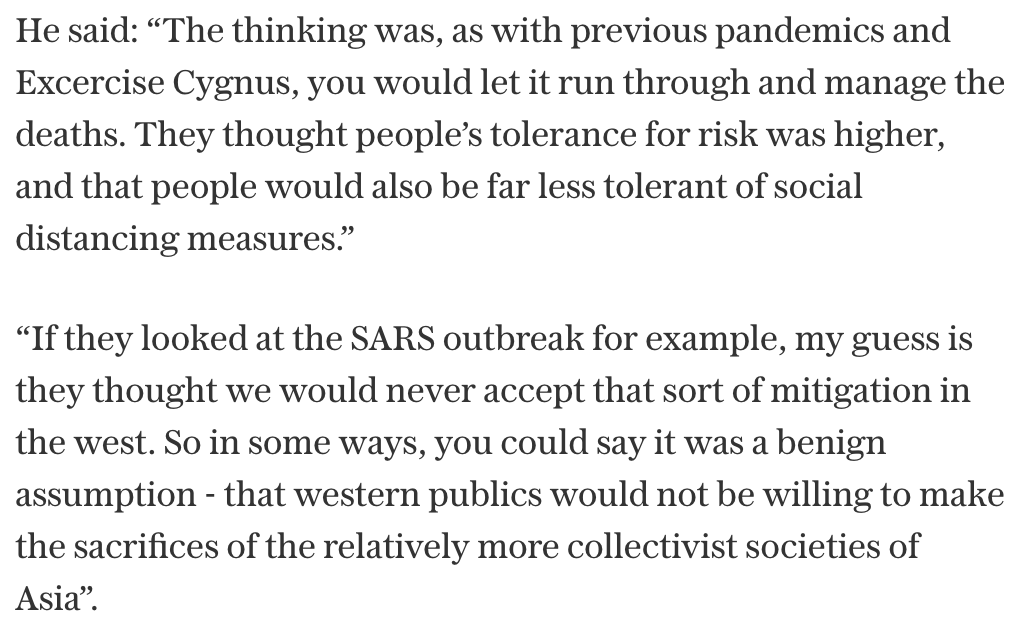The Government has announced is splitting up @PHE_uk PHE. You may think this a good or bad thing but do not be fooled. The agency is in many ways infuriating but most of what it is blamed for is the fault of others ... https://www.telegraph.co.uk/politics/2020/08/15/phes-systematic-failure-exposed-disaster-ten-years-making/
2/ That change is afoot should not come as a surprise. The Gov's exit strategy of May 11 flagged: "a rapid re-engineering of government’s structures and institutions to deal with this historic emergency". Some may cast this as politically opportunistic, others as necessary...
3/ It is fair to say PHE response has been "sluggish" but it is blamed for much that has nothing to do with it or is beyond its control. Duncan Selbie, CEO, has been far too shy in making this clear. I'm delighted he talked to us for this piece....
4/ Selbie: "The Department of Health and Social Care leads on all aspects of pandemic planning and preparedness, not Public Health England”. This is a fact. It's also true that @DHSCgovuk has a long history of gagging its agencies and then blaming them for its own mistakes...
5/ Selbie: “It was never at any stage our role to set the national testing strategy for the pandemic. This responsibility [also] rested with DHSC.... ". This again is a fact. As is this....
6/ Selbie: "Any suggestion that PHE monopolised, centralised and controlled pandemic testing, and even stopped others from developing tests or conducting them is not true.” These big strategic calls sit with @DHSCgovuk and therefore ministers...
7/ @NJ_Davies of the @instituteforgov makes this point well. He says “a nonsense” to say PHE is beyond the control of ministers. As an executive agency of the DHSC, it has “direct accountability to Matt Hancock"...
8/ Davies adds: “It’s fair to say the crisis hasn’t exactly been a good advert for what happens for services directly under government control. If you look at NHS test and trace – directly under the control of ministers – that’s clearly been a bit of a disaster.” Also true..
9/ Is it a good idea to hive off responsibility for infectious disease control to a new National Institute for Health Protection, as proposed today by @MattHancock ? And is it a good idea to do it now, in the midst of a crisis?
10/ I would say 'yes' to former (the Lansley reforms which abolished the old HPA were plainly wrong from the start) but 'no' to the later. One of the great frustrations of UK gov agencies is that they are slow to get going but once they get moving they get it right...
11/ As evidence for this, look at week 32's #COVID19 surveillance. It's as detailed as any I have seen. Yes, it should have been there from the start but PHEs masters - @DHSCgovuk and @hmtreasury did not plan for it or fund it https://assets.publishing.service.gov.uk/government/uploads/system/uploads/attachment_data/file/907954/Weekly_COVID19_Surveillance_Report_week_32_2.pdf
12/ Does any of this focus on PHE help explain what really went wrong in with the UK response? No, it doesn't. It is nothing more than a diversion and is perhaps designed that way...
13/ "Britain’s poor response to the pandemic will ultimately be explained by group think: a fatalistic and inflexible approach to pandemic planning that seduced not just Whitehall but much of Britain’s scientific establishment". And I should have included 'ministers' in this...
14/ Today it is best seen in the excuse proffered by almost any minister, civil servant or government scientist you challenge about Britain’s response to the pandemic: that all would be have been well had we been hit by pandemic flu rather than a coronavirus....
15/ "Britain had a first-class influenza pandemic strategy – second in the world after the US for its preparedness – and would have performed well had it been another Spanish flu, so the argument goes....
16/ This is the narrative pushed by @Jeremy_Hunt , the former Health Secretary, and Sally Davies, the former chief medical officer, who were responsible for Britain’s pandemic planning, but it will NEVER survive the scrutiny of the public inquiry to come....
17/ Why? Well, as @BallouxFrancois has pointed out “SARS-CoV-2 behaves in most ways like a pandemic influenza strain. The only major epidemiological difference between COVID 19 and flu pandemics is the age risk distribution" https://twitter.com/BallouxFrancois/status/1284513419454971905?s=20
18/ As @matthewlesh says, the real problem in Whitehall was “failure of imagination” and a misjudgment about society’s tolerance for risk.
19/ Group think and western exceptionalism were certainly part of the problem but, as @NJ_Davies points out it was money too. Years of austerity overseen by George Osborne saw the NHS protected but the capacity of its sister public health services dramatically cut...
20/ Says Davies: "The priority of governments since 2010 has been to keep tax as low as they can and - within public spending - to focus on efficiency over resilience.
"Those are perfectly reasonable political judgments to make, but clearly that has come back to bite us.”
"Those are perfectly reasonable political judgments to make, but clearly that has come back to bite us.”
21/ In short, you get the government machine and pandemic preparedness you pay for.
Full article here and it is open to read... https://www.telegraph.co.uk/politics/2020/08/15/phes-systematic-failure-exposed-disaster-ten-years-making/?utm_content=politics&utm_medium=Social&utm_campaign=Echobox&utm_source=Twitter#Echobox=1597524865
Full article here and it is open to read... https://www.telegraph.co.uk/politics/2020/08/15/phes-systematic-failure-exposed-disaster-ten-years-making/?utm_content=politics&utm_medium=Social&utm_campaign=Echobox&utm_source=Twitter#Echobox=1597524865

 Read on Twitter
Read on Twitter


